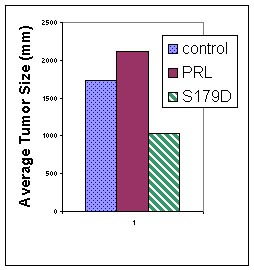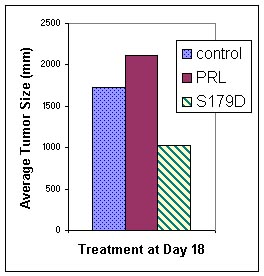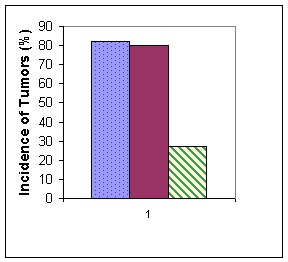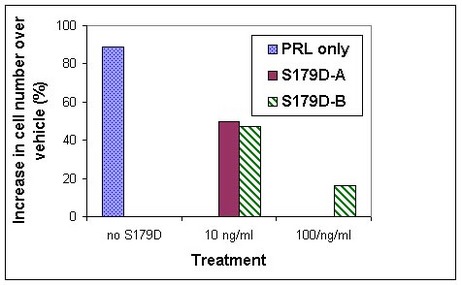Recombinant Prolactin Antagonist
The hormone prolactin (PRL) exerts various effects in a wide range of physiological processes. Research suggests that PRL may promote cellular proliferation in both breast cancer and prostate cancer cells.University of California researchers have developed a modified PRL analog (S179D) that acts as a strong antagonist to PRL in cell proliferation assays. S179D consists of a wild-type PRL with a single amino acid substitution. This substitution alters the activity of the molecule such that it antagonizes the growth-promoting effects of unmodified PRL in experimental breast cancer and prostate cancer cell lines.
Research results indicate that the modified S179D retains some functions of normal PRL. In other words, S179D may be a selective inhibitor of cell proliferation in certain systems, which suggests that it could potentially be used as a cancer therapeutic that did not wholly disrupt PRL metabolism throughout the body.
The University of California holds a soon-to-issue United States Patent claiming S179D and related PRL mutants.
The University is searching for commercial partners that are interested in investigating the potential of S179D as a therapeutic.
Examples
Figure 1. Effects of S179D on the proliferation of MCF-7 breast cancer cells
Normal MCF-7 cells produce PRL, making it difficult to study the effects of exogenous PRL. In this study, MCF-7 breast cancer cells were developed that are deficient in PRL production so that the effects of exogenously applied hormone could be elucidated.
Cells were cultured in media containing wild-type human PRL at 100 ng/ml. Cell numbers were measured at 48 hours, and the percent increase over the number of cells in the vehicle only control was calculated. In the absence of S179D, wild type PRL induced a near doubling in the number of MCF-7 cells. When treated with either of two forms of S179D (A or B), the growth-promoting effects of PRL were significantly reduced in a dose-dependent manner.
Figure 2. In one experiment, the administration of S179D prior to cancer cell injection was effective in decreasing both the incidence and size of tumors in mice injected with prostate cancer cells (A and B). In a second experiment, mice previously injected with prostate cancer cells were treated with S179D, which was effective in reducing tumor size (C).
2A. At day 1, nude mice were implanted with minipumps administering control vehicle, wild type PRL, or S179D. On day 4, mice were injected with DU145 human prostate cancer cells. On day 22, mice were assayed for tumor incidence and size. S179D significantly reduced the incidence of tumors.
2B. PRL slightly increased tumor size while S179D significantly reduced tumor size.
2C. In a separate experiment, mice were injected on day 1 with DU145 human prostate cancer cells. At day 18, mice were implanted with minipumps administering control vehicle, wild type PRL, or S179D. On day 42, tumor size was measured. PRL promoted increased tumor size while S179D significantly reduced the size of well-established tumors.
REFERENCE: 1996-166
Attached files:




Patents:
US 6,890,738 [MORE INFO]
Type of Offer: Licensing
« More Biotech Patents
« More Genetics Patents
